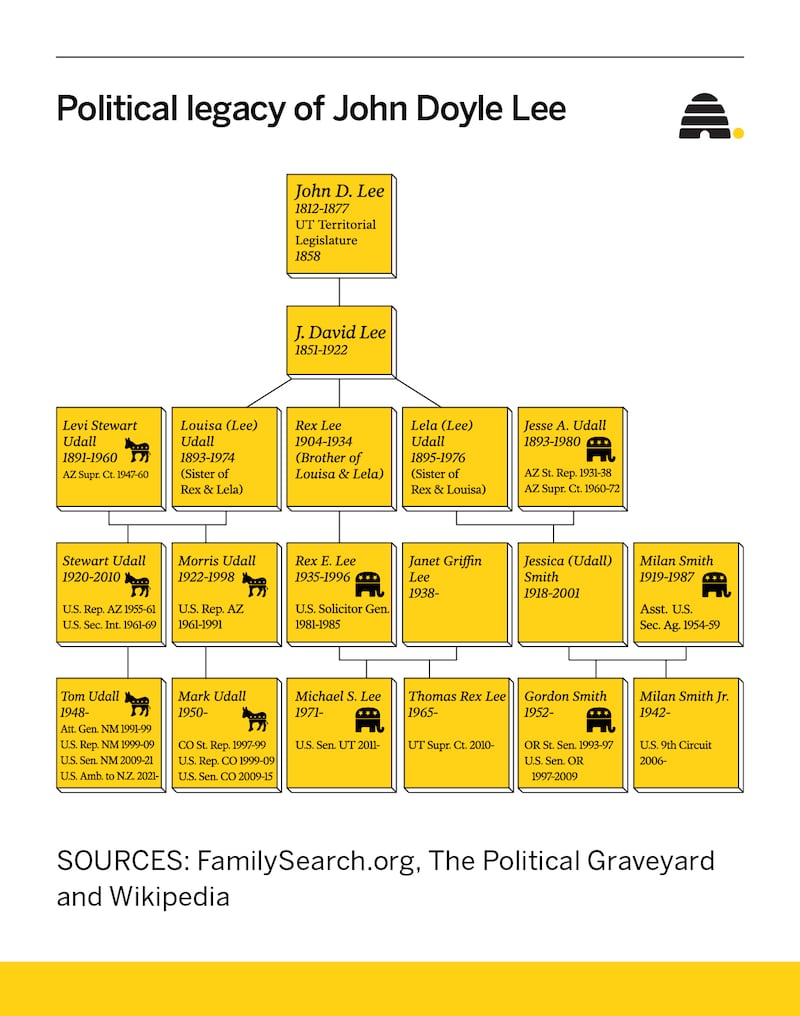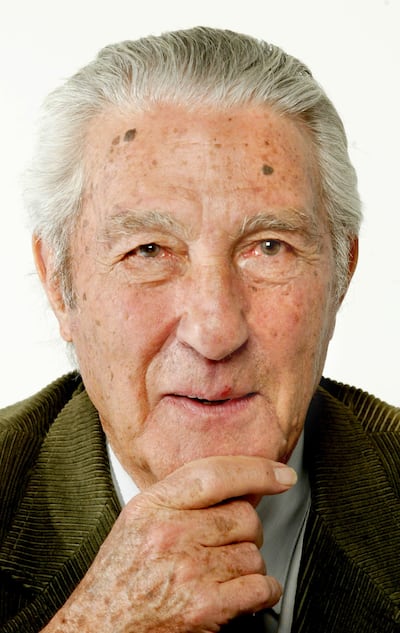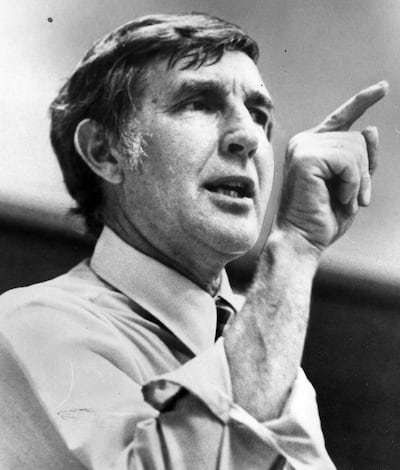A 10-year-old Mike Lee heard a knock on the door of his McLean, Virginia, home, where the family had just moved from Utah.
When his dad, Rex E. Lee, opened the door, the young boy listened to a man outside, “Hi, we’re your ward teachers.”
“My dad just laughed and said, ‘Come on in guys.’ I remember him saying something like, ‘Well, that shows how long it’s been since you’ve set foot in a Mormon church, doesn’t it?’” the now Republican senator from Utah recalls.
His dad was poking fun at first cousins Stewart and Morris “Mo” Udall, who used an antiquated title for Latter-day Saint “home teachers” who visit fellow congregants in the neighborhood to share a religious message. Today, they are called ministering brothers or sisters.
The senator said his dad’s cousins lived nearby in the same Fairfax County residential community that has long been home to diplomats, members of Congress and high-ranking government officials.
But the scene of his dad chatting it up with relatives, who all hailed from the tiny eastern Arizona town of St. Johns, marked the first time the younger Lee began realizing his extended family was populated with political and legal legends from the West dating back to the 1850s.

His dad had just been appointed solicitor general for the Reagan administration. Stewart Udall was a former congressman and Interior secretary in the Kennedy and Johnson administrations. And Mo Udall was in his 11th term representing Arizona in the House. Three more Udall-Lee relatives (one Republican and two Democrats) would serve in the Senate, and Mike Lee became the fourth.
If the senator from Utah fails to win a third term this year, it could end a remarkable streak of a Lee or Udall relative serving in Congress in every decade since the 1950s.

“The Udall-Lee run of eight consecutive decades in Congress is nearly unprecedented,” said Jane L. Campbell, CEO and president of the U.S. Capitol Historical Society. “Only the Dingells surpass the Udall-Lees for their consecutive number of decades in either chamber of Congress. And only the Kennedys match the Udall-Lees in that regard.”
Udall and Lee relatives often wave off comparisons to the Kennedys, Bushes, Roosevelts, or Dingells. Former U.S. Sen. Mark Udall, of Colorado, once recalled his aunt summing up such comparisons this way: “The Kennedys are wealthy, Catholic New Englanders; the Udalls are poor, Mormon dirt farmers from the West.”
For better or for worse, those “dirt farmers” have had an outsized economic and environmental impact on the West, and observers say their public service the past eight decades is felt today in the White House, Congress, the Supreme Court and throughout the nation.
The Udall-Lee family’s impressive political legacy had an inauspicious beginning. Both lines of politicians share a common ancestor — the notorious pioneer frontiersman John Doyle Lee.
An early convert to The Church of Jesus Christ of Latter-day Saints, Lee trekked across the Plains and helped settle the harsh southern Utah desert. He served in the Utah Territorial Legislature in 1858.

The political post came after Lee was a leading participant in one of the darkest chapters in western United States history that led to his execution by firing squad. Criminal trials nearly 20 years after the crime showed he helped carry out the massacre of more than 100 men, women and children, during a climate of hysteria when federal troops were headed to Utah. The victims comprised an emigrant company from Arkansas making their way to California when they were slaughtered on Sept. 11, 1857, by a group of Latter-day Saint settlers and Paiute Indians in southwestern Utah.
A monument stands at the National Historic Landmark memorializing what is known as the Mountain Meadows Massacre. And Lee’s involvement in the atrocity troubled many of his descendants then, and now.
“I remember hearing my grandmother, Lela Lee Udall, who was a granddaughter of John D. Lee, once express that it was a very heavy cross that her family had to bear as a legacy of John D. Lee,” recalled Gordon Smith, a Lee and Udall descendant who served two terms as a Republican U.S. senator from Oregon.
Sen. Mike Lee said he senses the two criminal trials his ancestor went through may have influenced his grandfather’s decision to go to law school. John D. Lee’s first trial ended with a hung jury. And his attorney, William Bishop, who expected the same result in the second jury trial, was caught unprepared as a new prosecuting attorney won a first-degree murder conviction, said Richard E. Turley Jr., a former assistant church historian and co-author of a forthcoming book on the aftermath of the massacre and the Lee trials.
Lee’s execution by firing squad took place at Mountain Meadows.

Among Lee’s most loyal defenders was his son John David Lee, whose mother was Lee’s 14th polygamous wife. And it was from John David that the Lee-Udall political progeny sprang.
Two of his daughters — Louisa and Lela — married Udalls, who themselves and several of their siblings held prominent public offices throughout Arizona, including mayor of Phoenix and chief justice of the state Supreme Court. And their children continued the tradition with Stewart Udall becoming the first in the family to be elected to Congress in 1955 as a Democrat.
He served until 1961, when he was named interior secretary in the Kennedy and then Johnson administrations. His brother Mo Udall succeeded him and represented the state’s 2nd Congressional District for 30 years. During that time, he lost the Democratic nomination for president to Jimmy Carter in 1976.

Their Republican cousin Rex E. Lee, a grandson of John David Lee, served as U.S. solicitor general from 1981-85. His oldest son Thomas Lee, an associate justice of the Utah Supreme Court, had been on short lists, along with his brother Sen. Mike Lee, of potential U.S. Supreme Court nominees during the Trump administration.
When Mo Udall resigned in 1991, a Udall-Lee descendant was absent from Capitol Hill for nearly six years, until Smith was elected to the U.S. Senate in 1996. Two years later, cousins Tom Udall and Mark Udall, both Democrats, won congressional seats in New Mexico and Colorado, respectively.
In 2008, Tom and Mark won U.S. Senate seats but Smith lost his bid for a third term. The rare occurrence of having three relatives serving in the U.S. Senate at the same time happened two years later, when Sen. Mike Lee was first elected.
While far apart politically, Lee said the Udalls supported their freshman cousin across the aisle.
“Every new member is assigned a mentor upon arriving, and Tom was assigned to be mine,” Lee said. “It’s someone to look out for you and tell you how the place works. He was very helpful.”
Tom Udall, Stewart Udall’s son, is now U.S. ambassador to New Zealand after two terms in the Senate.

Research into political dynasties in America finds that “power begets power.” A 2007 study on political dynasties in Congress since 1789 found that “legislators who enjoy longer tenures are significantly more likely to have relatives entering Congress later.”
The research didn’t offer reasons, but one of the authors told Reuters that it could be children of political parents gained name recognition, learned valuable political skills or got access to political machinery that smoothed the way into a career in politics.
Mark Udall, Mo Udall’s son, explained there was never pressure in the family to pursue politics, but when people like Bobby Kennedy and other prominent people are dropping by the house it does leave an impression.
“I just thought public service was a wonderfully exciting and rewarding and meaningful way to be in the world,” he recalled.

Smith had a similar experience. His father, Milan Smith, served in the Eisenhower administration, so he spent his early years in Washington, D.C., and was well aware of the political prominence of his distant cousins Stewart and Mo Udall. When he considered entering Oregon state politics, he and his mother paid a visit to her cousin Mo, who was hospitalized with Parkinson’s disease.
“I told him I was thinking of running for the Oregon state Senate. And he didn’t make any comment of regret that I was a Republican, but he encouraged me to do it.”
Lee, who also recalls dropping by cousin Mo’s congressional office when the younger Lee was a Senate page, added that he never felt any expectation to enter politics and that the Lee-Udall legacy in Congress isn’t a factor in his seeking a third term.
“I can tell you without hesitation that has never entered my mind,” he said.
Mark Udall believes future generations of the family will likely get into politics when the timing is right for them. He didn’t decide to run for political office until his mid-40s and the process of campaigning didn’t come naturally.
“I had climbed the third-highest mountain the world, but I was too scared to go knock on doors,” he said with a laugh.

The future generation of Lee-Udall politicians will be following ancestors who affected the lives of nearly everyone in the West and many around the country, observers say.
“If you live on the Wasatch Front and all the way to Tucson, you’re affected by them every day through water because they got both the Central Utah Project and the Central Arizona Project funded,” said retired history professor Ross Peterson, who has researched and written about the lives of Stewart and Mo Udall.
Endangered species protections, national parks and recreation areas, wild and scenic river designations, and wilderness designations were created and expanded under the watch of the two brothers.
While they were both icons in the environmental movement, the wisdom of the ambitious hydroelectric dam building during the 1960s that fueled ongoing economic growth in the West is questioned by some today. Researchers have since learned more about the impact the projects have had on fisheries, and the megadrought afflicting the region the past two decades has policymakers rethinking how to quench continuing growth with a shrinking water supply.
Smith, who lost a son to suicide stemming from mental illness, sponsored legislation to put federal funding for mental health on par with other health care needs and changed the debate over mental health in Congress.
Peterson said the family’s efforts through national policy and nonprofit initiatives to right wrongs done to Native American tribes by white settlers began when Levi Udall, Stewart’s and Mo’s father, wrote the majority opinion for the Arizona Supreme Court extending the right to vote for Native Americans living on reservations.
The Lee influence on the law didn’t stop at the state level. Smith’s brother Milan Smith Jr. was appointed to 9th Circuit Court of Appeals in 2006, where he wrote a unanimous opinion in 2020 finding Nevada’s COVID-19 restrictions violated religious freedom.
The most influential in the legal arena was arguably Rex E. Lee, who is regarded by conservative and liberal legal scholars as the model solicitor general, said retired D.C. Circuit Judge Thomas Griffith.
While Rex E. Lee is often noted for winning a high percentage of the cases he argued for the government before the Supreme Court, Griffith said he was admired by his successors for skillfully and balancing the interests of the administration and the nation at large.
“Sometimes the solicitor general is referred to as the ‘10th Justice.’ That’s overstating it a little bit, but there is a history of the Supreme Court being able to trust the solicitor general,” Griffith said. “And as much as anybody, Rex is responsible for that.”
The solicitor general wasn’t the only Lee or Udall to have impressed and influenced Griffith. He lived across the street from Congressman Mo Udall, who gave the 15-year-old neighbor boy his first job on Capitol Hill as a summer intern.
Being too young to drive wasn’t a problem for Griffith.
“Every morning that summer, Mo Udall would come up in his used Mustang convertible and honk the horn and little Tom Griffith would sit in the car with him and drive down to Capitol Hill. And then at 5:30 at night, he’d come by and say, “Let’s go home,” Griffith recalled. “It was awesome.”
While their politics diverged, they stayed close until Udall died in 1998. Griffith, a Republican, was serving as chief legal counsel to the Senate and was asked by Udall’s widow to sit with the family during a memorial service in the Capitol. When Senate Democratic leader Tom Daschle came over to pay his respects he gave Griffith a quizzical look, prompting the Republican appointee to explain his awkward situation.
“I told him, ‘I don’t want you to tell this to (Majority Leader Trent) Lott. I used to work for Mo Udall and he’s one of my heroes.’” Griffith recalled. “And he looked at me and said, ‘OK, our secret.’”
Editor’s note: Matthew Brown’s wife, Barbara Jones Brown, is co-author with Richard E. Turley Jr. of a forthcoming book on the aftermath of the Mountain Meadows Massacre and criminal trials of John D. Lee.


